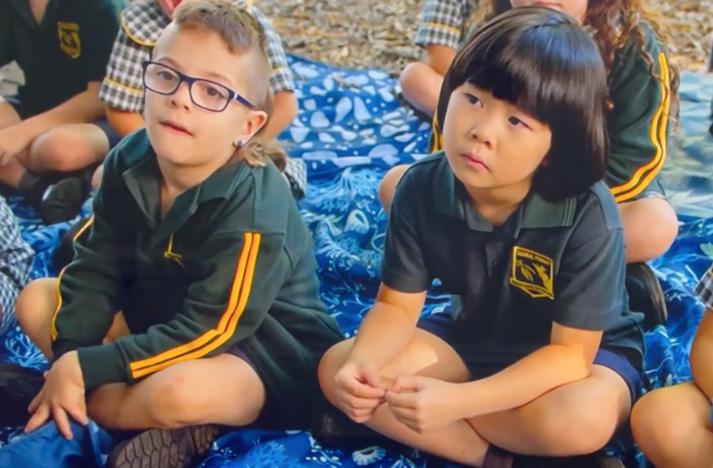2023 Annual Impact Report





Primary Ethics recognises the traditional owners and custodians of the lands on which we work. We pay our respects to Aboriginal elders past, present and emerging and celebrate their ongoing connections to the lands and waters of Australia.
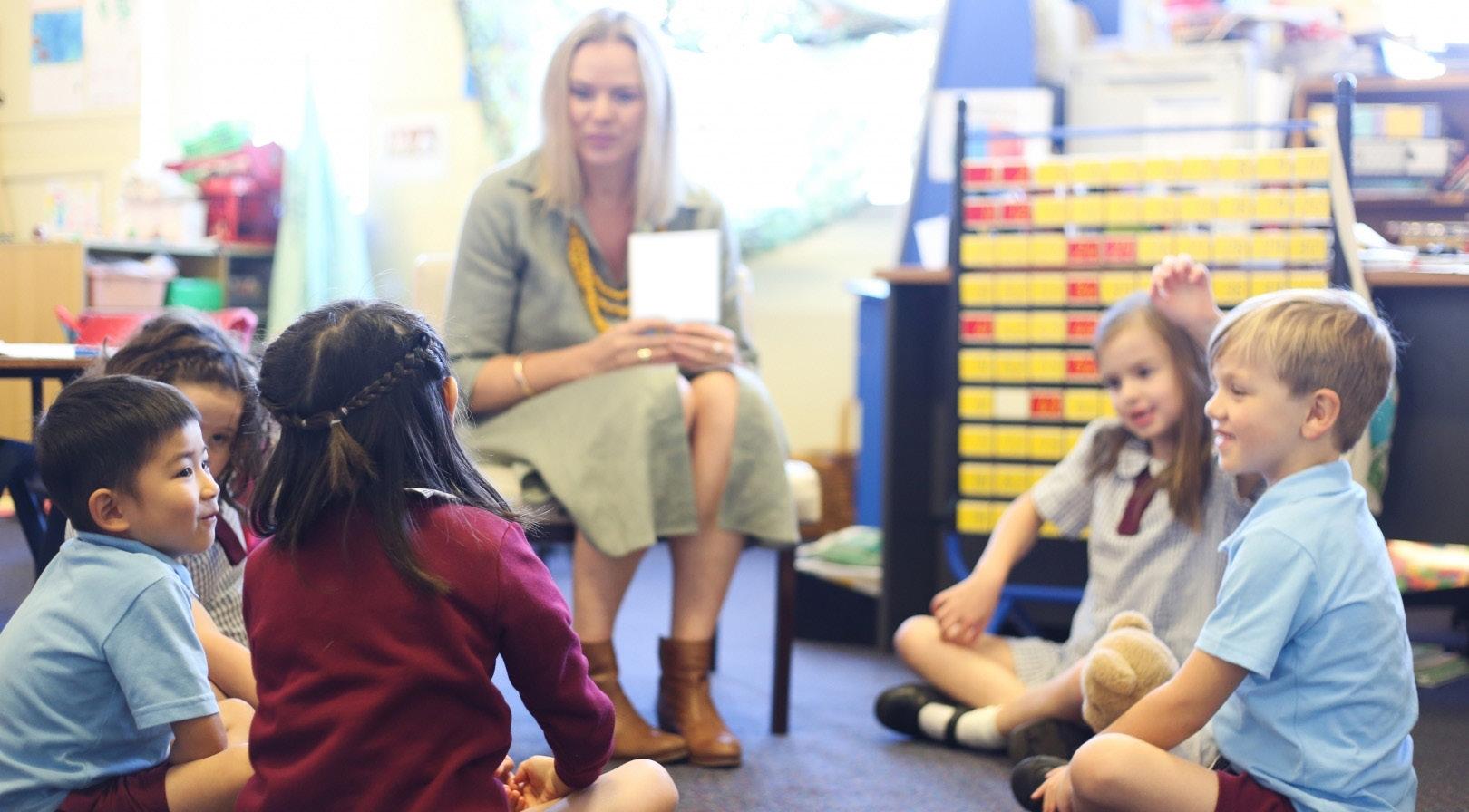
2023 was a year where we successfully consolidated our standing as a major volunteering organisation in the face of a broad downturn in volunteering across all community groups.
We have proven our resilience in a society still experiencing significant challenges and change. It is clear that the social and economic pressures being experienced by individuals and communities have affected volunteering activity in general. Volunteer hours are down and numbers of volunteers are down across the nation. We are very proud we’ve been able to retain our wonderful volunteers against this trend and are keeping our teams dynamically engaged. Our volunteers are highly motivated and regularly tell us how rewarding, indeed inspiring, they find their role in bringing our ethics program to schoolchildren.
Our volunteers are backed by our small team of professionals delivering the expert operations, volunteer support, curriculum, training and communications effort needed to ensure our ethics program keeps going to more than 45,000 children in 500 NSW public schools each week. We’re also grateful to those schools for their support of our program.
This Impact Report highlights just some of our work in 2023, much of it aimed at acknowledging the achievements of our volunteers and working closely with them to support their classroom experience and enhance the student experience, following the
program review conducted late in 2022. That review found that the volunteers surveyed were very grateful to have someone come and watch their classes. They appreciated more contact with Primary Ethics. We listened.
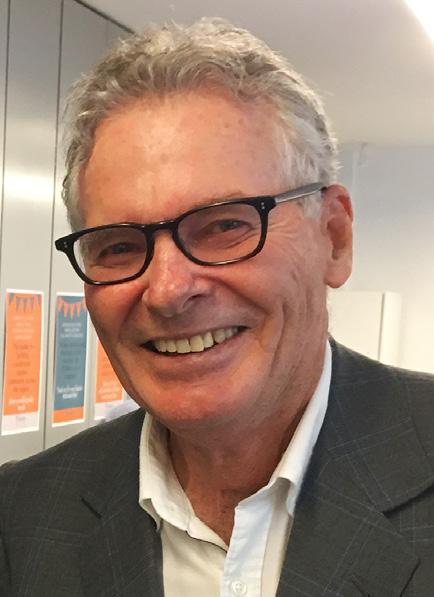
We launched the Kinghorn Award for volunteer of the year (named after our major benefactors, the late John Kinghorn and Jill Kinghorn) and along the way unearthed stories of hundreds of quiet achievers. We began a recognition program for long-serving volunteers to celebrate the many years they have devoted to teaching children ethics. We created and delivered an identifying lanyard for all our volunteers to wear with pride on school grounds. To add more support and enhance the community of inquiry in ethics classes, we sent a display copy of the new discussion rules to every volunteer.
A big thank you to all our committed volunteers and the wonderful staff and Board of Primary Ethics who have worked tirelessly in difficult conditions. Also, our grateful thank you to our valued financial supporters who help make our mission a reality.
It’s an honour to bring you this 2023 Impact Report
Enjoy reviewing the year.
Bruce Hogan AM Chair of the Board of DirectorsPrimary Ethics Ltd
“Our volunteers are highly motivated and regularly tell us how rewarding, indeed inspiring, they find their role”
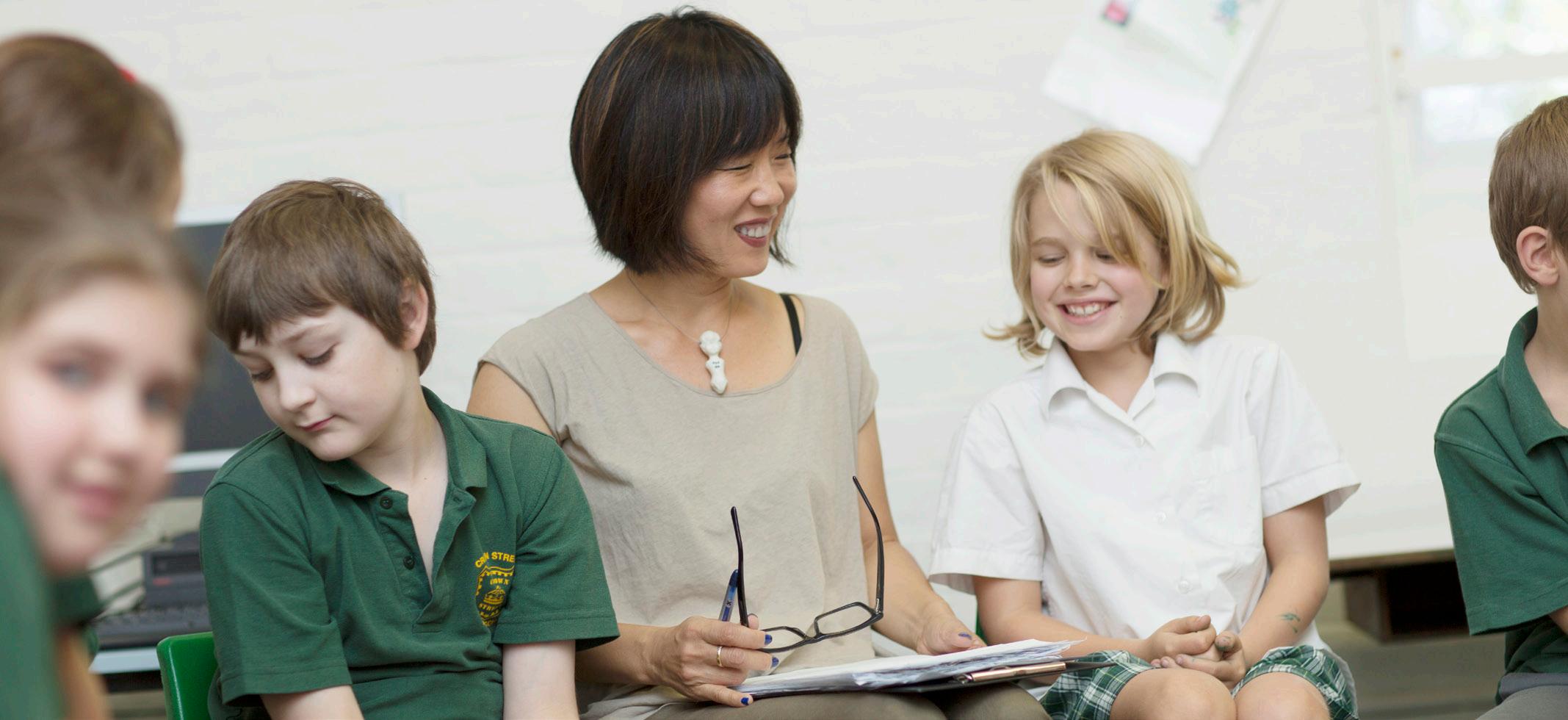
Primary Ethics is an independent not-forprofit organisation and the sole provider of ethics classes in NSW public schools. We receive no government funding and we keep the classes free for families.
Primary Ethics helps children develop skills that are essential in our modern pressurised world – learning to give evidence-based reasons for their opinions, being able to disagree without putdowns and to make well-reasoned decisions.
Children attending ethics classes grow up to have their own well-grounded ethical framework, a sense of right and wrong as well as the personal values and social skills that allow them to work with and empathise with others.
All lessons are delivered by our impartial volunteers who present stories from our expert curriculum that encourage children to consider what they would do – and what they ought to do – in various situations.
At Primary Ethics we are working towards giving all families the option of choosing ethics education for their child.
We create learning environments in which children practise respectful discussion.
We employ robust recruitment and screening practices to ensure the integrity of our volunteers and the highest standards in child safety.
We provide a learning environment in which students of all faiths or no faith can learn together.
Our teacher-training program and curriculum are continually improved to ensure excellence in the classroom.
In ethics classes children learn that ethical issues are more easily understood by talking with others than by thinking alone. Members of the school and broader communities work together to provide ethics education for children.
Supporters
In Term 4 of 2022 we conducted a review of our ethics education program in action in schools. A team of trainers and classroom support officers observed lessons in 76 different schools, a complex undertaking.
A high-functioning community of inquiry was the quality benchmark looked for in the review. Achieving this encompasses continual improvement of our curriculum and lesson materials, plus excellent training and ongoing support of volunteer
Our lesson materials
• Stories and scenarios on a range of topics
• questions with no easy/straightforward answer
• balance of philosophical perspectives
in combination with our ethics teachers
• who bring the stories and scenarios to life
• create a sense of curiosity about topic and questions
• facilitate discussion of questions
• model the inquiry process, and
• remain neutral
teachers. Together these come to life in the ethics classroom as teachers and curriculum keep students highly engaged so that they are able to straightforwardly develop their skills in critical thinking, ethical reasoning and collaborative inquiry.
With the preliminary findings of the program review available to us by the end of 2022, we were very happy to find that our ethics education program is in very good health and largely living up to our ideals. Of course there were areas that could be improved, as outlined in our report (primaryethics. com.au/program-review-2022-23/).
… prompt students to
• express their own views and reasons for holding them
• consider and engage with a range of views
• judge whether the reasons they and others have are good reasons (ie. relevant, logical, supported by evidence)
• think about important ethical concepts, including intentions, circumstances, consequences and what contributes to good character
• empathise with people in different situations
… which helps students develop skills in
• collaborative inquiry
• critical thinking
• ethical reasoning.

With the report in, we immediately began implementing improvements and enhancements of all aspects of our work and launched into 2023 with new ideas, new resources and big impact. We’ve subsequently found that improved support for volunteers in and out of the classroom dovetails perfectly with improved quality of the community of inquiry and thus the student experience of ethics lessons. An improved experience flows seamlessly into enhanced ethical reasoning skills.
Every week of every school term sees thousands of dedicated Primary Ethics volunteers give their commitment and generosity, time and skills to their students.
This year for the first time we provided branded lanyards to all our volunteers (see page 8) to wear with pride at their school.
At the same time, arising from the review, we distributed to every volunteer a display copy of our streamlined discussion rules, the roadmap for ethics lessons, paired with a video explaining their importance (see page 9).
We also began the ongoing rollout of a comprehensive achievement program (see page 8), acknowledging the years of dedication from a great many of our volunteers. Not only does this rightfully pay tribute to their commitment, bringing it to the attention of newer volunteers, but it is an effective volunteer retention tool.
Also arising from the program review, we took on and completed the mammoth task of rewriting the Ethics Teacher Handbook for the first time since 2019. This was a major update to content, including improvements in best teaching practices and learnings from delivering our program in those years. The classroom support team also undertook to check in with all new ethics teachers within six months of them starting to teach, responding to the clear message from volunteers that they appreciated direct contact and support. We also anticipated that checking in with new teachers would have
clear benefits - extra support during those first few lessons/months can help training stick and catch any issues early.
At the same time, our staff area managers began reading all post-lesson reports from the start of 2023 and initiating contact with teachers who reported having challenges. The program review shifted our emphasis to this kind of proactive support.
In May 2023, we celebrated National Volunteer Week with a webinar spotlighting the contribution made by our community volunteers. Post-lockdowns, most of our community volunteers felt able to return to volunteering with us. We’re proud of them and of
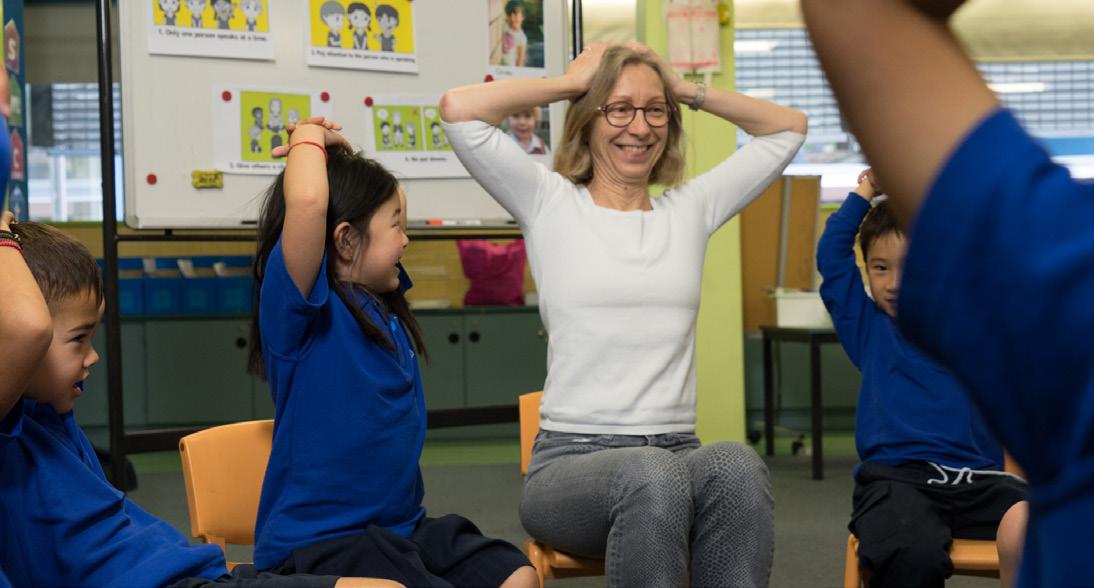
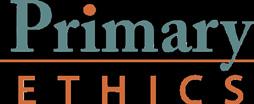

ourselves for such solid retention rates in the face of a difficult volunteering environment.
These volunteers generously give their time and energy to teaching ethics despite having no direct connection, such as children or grandchildren, at the school. Perhaps it’s plain to see what motivates parent volunteers - they want their children to have the option of ethics, they want to get involved in their children’s school. Yet what makes someone step out of the local community to teach ethics?
What do they get out of it? What do they bring to it? Six community volunteers shared their stories in a crowded session. They each came to ethics via a different path - in response to a Volunteer ad on SEEK, because they are studying to become a teacher, hearing about it in their workplace, and more. It was a fascinating and very popular event.
We are enormously proud of our extensive curriculum which aims to give students from kindergarten through into high school the opportunity to think for themselves and discuss ethical issues of direct relevance to them. Ethics teachers use highly detailed lessons to deliver this and every week have the opportunity to post feedback about how their lesson went, parts of the script they perhaps found confusing, parts that the children loved.
This year we collected 5716 pieces of valuable practical feedback on our curriculum and are pleased to note that this feedback was overwhelmingly positive. We also increased the number of curriculum topics revised to 109 and introduced seven brand new topics. Our curriculum is gold!
One interesting result of the program review was that larger classes are not necessarily unworkable (we recommend class sizes of eight to 22). This led us to consider how best to support these larger classes. So we set up observations of a number of large classes in action early in 2023, did research on best practice for teaching large classes (including doing philosophy with children with a large number of students) and put together a set of
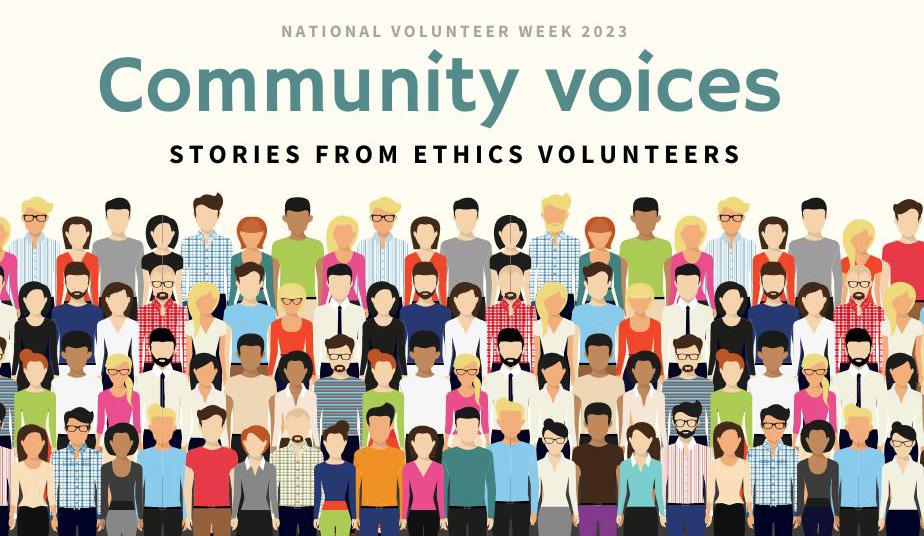
recommended curriculum updates based on those observations and research.
We have since updated the S3 even-year curriculum to include those adjustments (and tweaked our training as well).
Those updates will mean our teachers with 16-22 students will have a better experience. We expect to extend the improvements across the whole curriculum over time.
We held 71 new teacher training sessions, including 14 face-to-face sessions and 57 online sessions. In these we trained 634 new teachers, equipping them with valuable facilitation and classroom management skills. The number of new high school teachers doubled to 12, helping us expand our program to new schools. Our team of skilled trainers also grew to 14. We are particularly proud of the consistently high evaluations and excellent feedback we receive from participants, both for the content of the training and for our inspiring trainers.
We implemented some changes to our training programs in response to the program review. One of the most significant review findings was that going off script correlated with a poor community of inquiry. Going off script can hinder the carefully scripted progression of ideas and limit and rein in students’ free-flowing ideas. In response to this finding, we built an increased focus into our training on the imperative to stick to the script. We also began placing further emphasis in new teacher training on the importance of sitting in a circle –sitting in a circle means everyone is equal, students
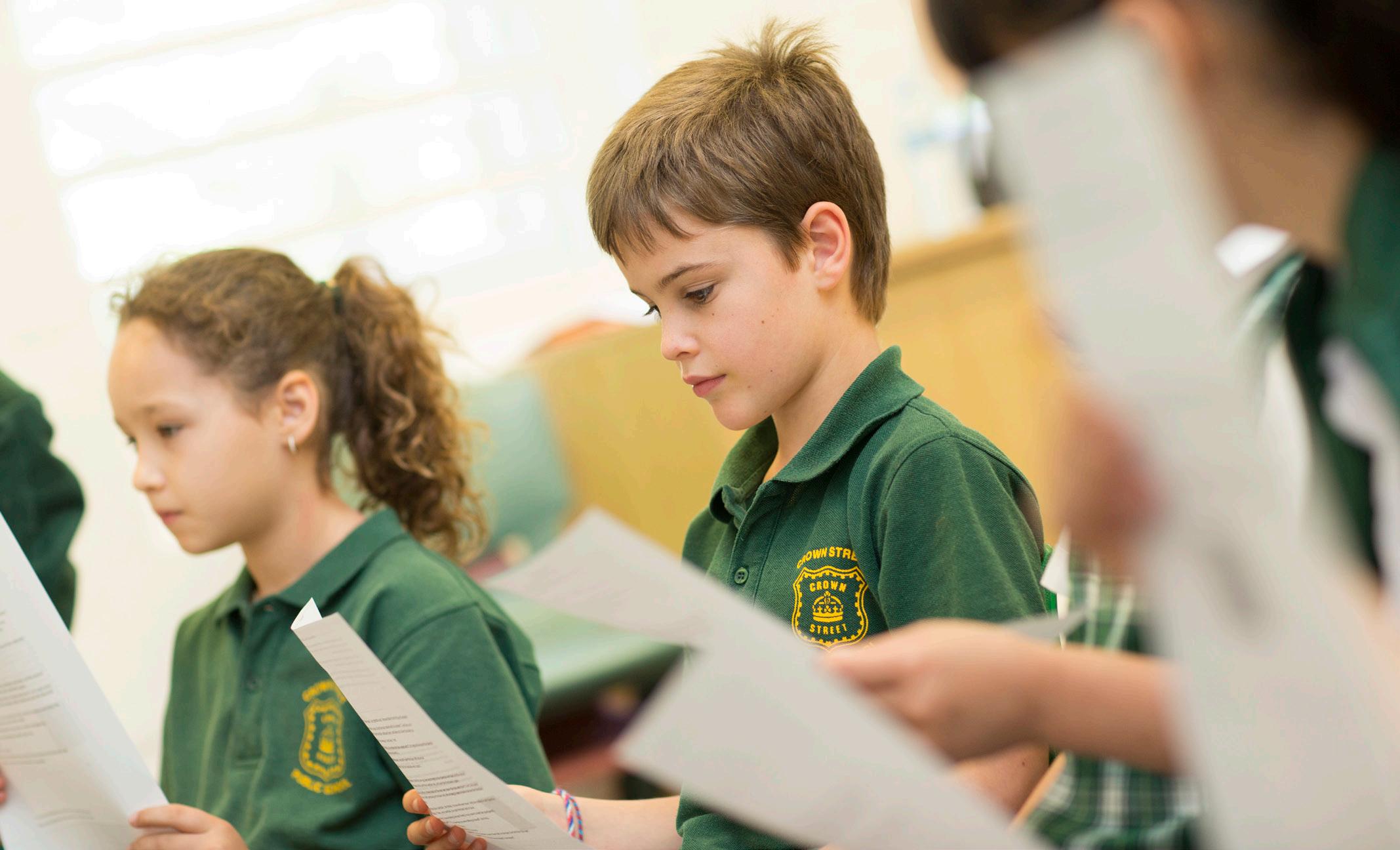
are more likely to speak to each other and the teacher can see everyone and proactively manage disruptive behaviour. Sitting in a circle is vital to a good quality community of inquiry.
This year we also tightened our training schedule so that teachers don’t have large gaps between training and beginning to teach – a factor the review had found could negatively influence the quality of their teaching. So we have closed those gaps.
We also planned a series of workshops for later in the year to address gaps around facilitation and classroom management identified in the review.
Our high school program continued to grow slowly and steadily in 2023. Ethics classes are now a popular option for Year 7 and 8 students at Lindfield Learning Village and Year 7 students at Concord High School. We trained 24 new high school teachers throughout the year. The training team also modified our high school teacher training so that it can be delivered online and as a result we saw an increase in participants from regional areas.
This year we also tightened our training schedule so that teachers don’t have large gaps between training and beginning to teach...
At the beginning of the school year in 2023, we sent every Primary Ethics volunteer a branded lanyard to wear when they are on school grounds. We’d never done anything like this before – and it was a huge hit with ethics teachers! There’s a pride in wearing the lanyard and being identified with the ethics program when passing children and teachers in the playground. Students can see Think Reason Discuss written on the lanyard strap, a reminder of the aim of the ethics lesson. The lanyards connect solo volunteers, possibly isolated in a rural school, with the whole Primary Ethics community. They also lend credence to our volunteers where perhaps a school is unsupportive.
We launched our new recognition program at the end of 2022 – rewarding longstanding volunteers with a certificate and spiffy lapel pin. Altogether, we found that over 1100 volunteers had stayed with us for from three to 11 years – and counting! This is a remarkable testament to how personally rewarding our volunteers find their role. Going forward, certificates and pins are awarded at the three, five, seven and 10-year marks, given out by ethics coordinators at local team gatherings – a bonding experience!
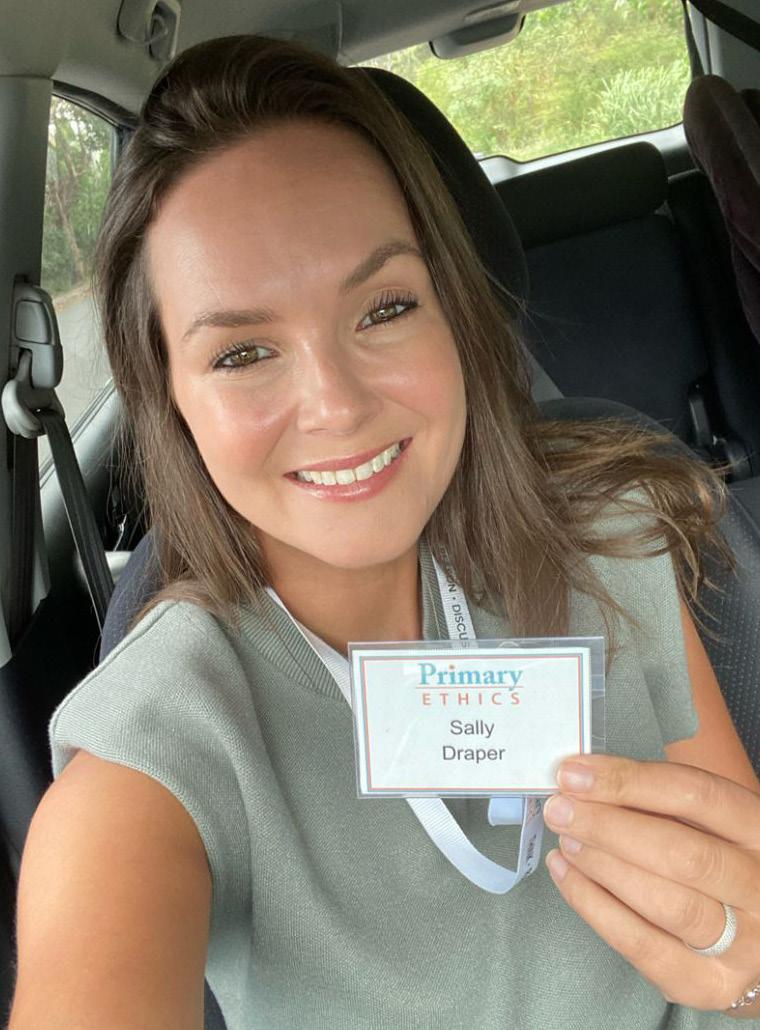
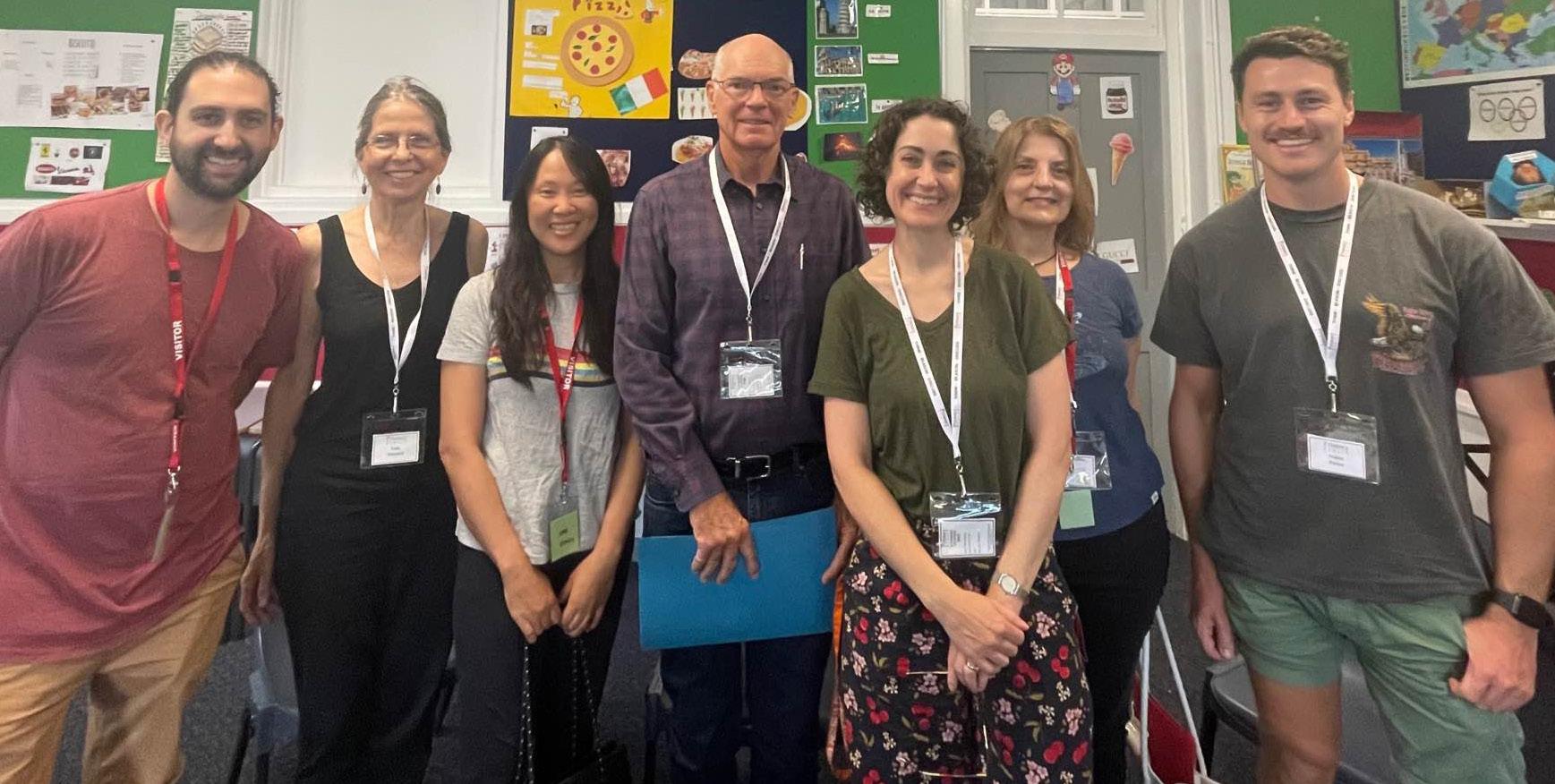
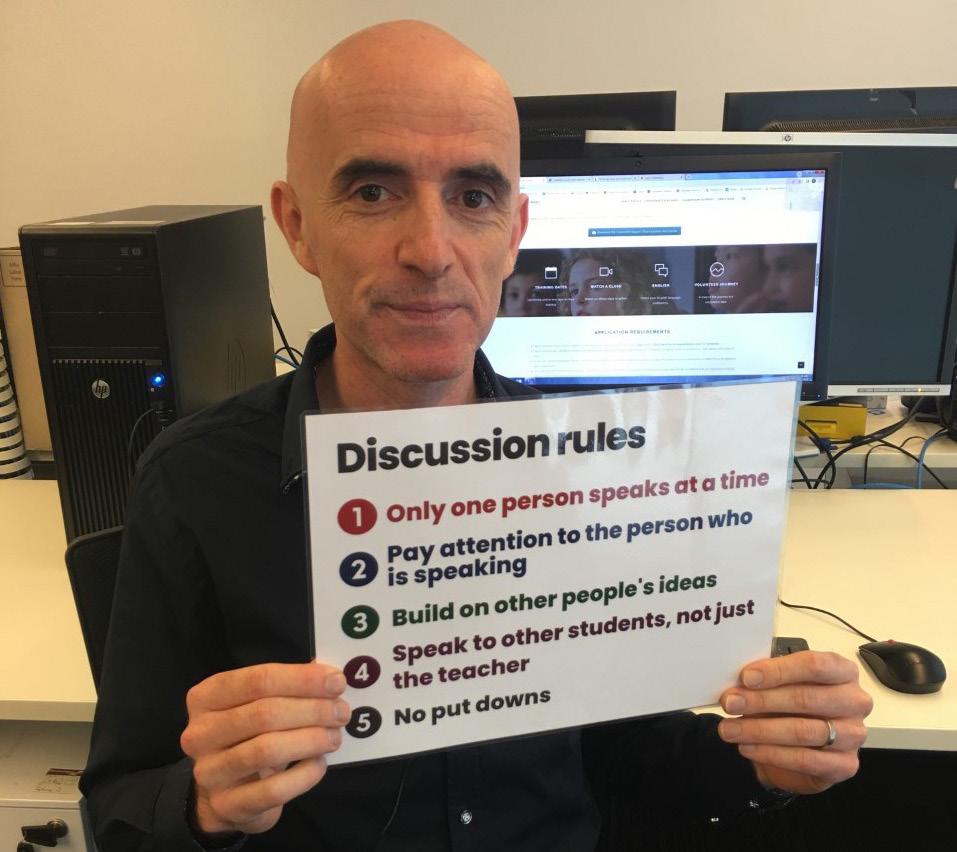
At the start of 2023, the six ethics class rules were replaced by five discussion rules. These discussion rules are for stages 1, 2 and 3 (which is Years 1- 6), not for Kindy or secondary students (who have separate rules and guidelines). Nevertheless, we started the year by sending every volunteer a copy of the new rules, as our teachers move around and teach different ages at different times. The first two lessons were rewritten to introduce the rules to all students.
1. We updated the rules as part of our commitment to continuous improvement, incorporating valuable feedback shared with us by ethics teachers over the years.
2. We now call them discussion rules as they are primarily a roadmap for the type of discussion we want to see in all ethics lessons. This name helps students see how they’re different to the school rules and any classroom behaviour rules.
3. We reduced them to five to help students focus on what’s most important.
4. We clarified the language to make it as meaningful as possible to today’s children.
1. The rules are our important grounding tool and roadmap for helping create a genuine community of inquiry. When teachers notice a student – or the entire class – veering off course, they can point their attention to the relevant rule and remind them to follow it. If necessary at any point, teachers can start a discussion about a particular rule and our reasons for following it.
2. One of the major findings of the program review of 80 lessons conducted late 2022 was that only a surprisingly small number of teachers had the rules on display. However, where they were on display and used by the teacher to guide discussion, the community of inquiry amongst students was found to be far more robust than where the rules were absent.
Immediately the 2023 ethics classes began, we began to get feedback about how useful it was to have this attractive version of the new rules to display. This was a big win!
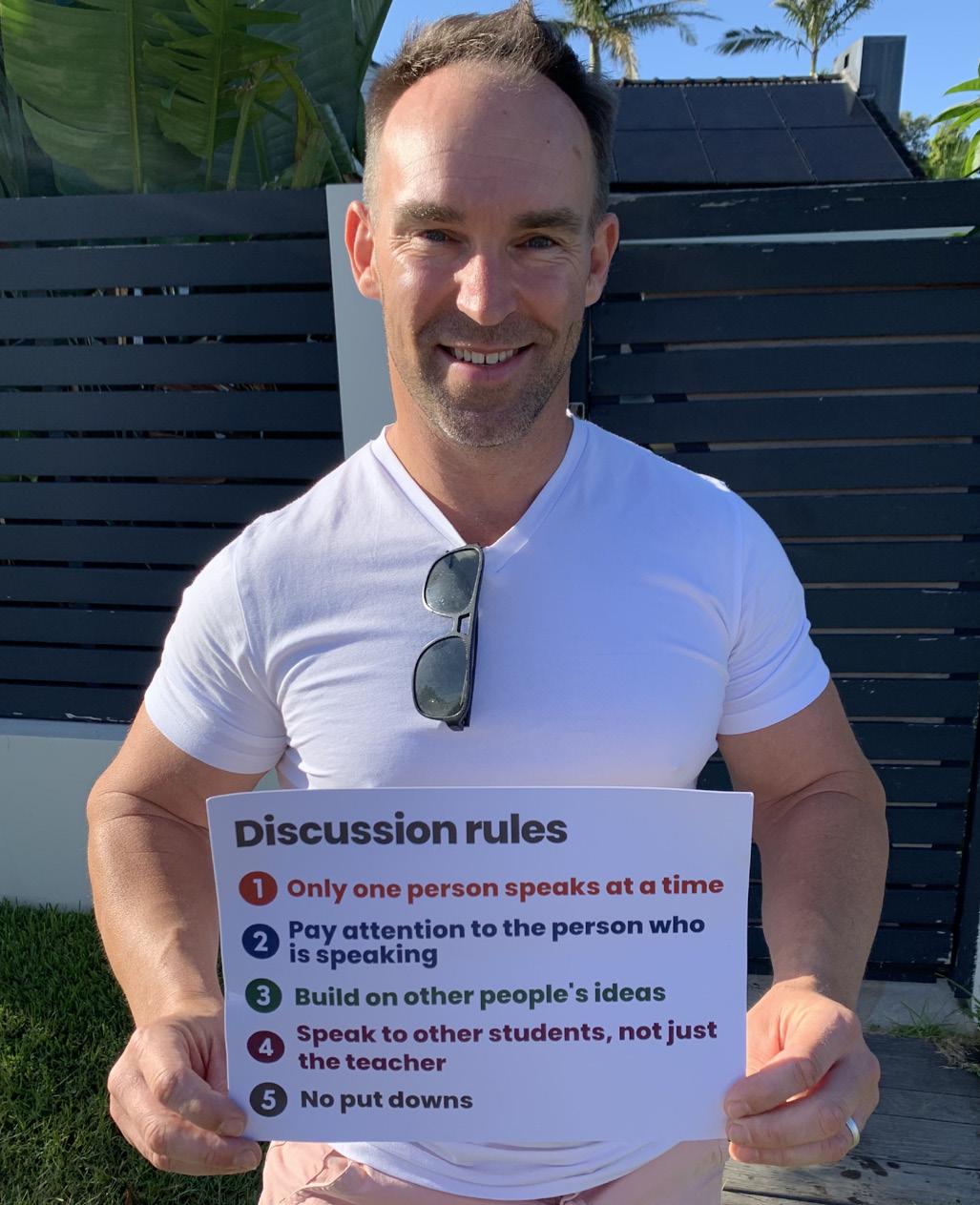
“Teaching ethics is a two-way street, both the young and the older get taught.” Roger
“It’s so fulfilling when certain quieter students finally feel safe to speak up.” Becs
“I have had two workplaces escalate my application ahead of others on the basis of my ethics teaching. It can be so great for confidence getting back to work after a career break.” Bec
“Ethics is the happiest thing I do in my week (and I often have nice happy weeks!)” Sue
“These kids say the most profound things with such ease that it fills your heart with joy and hope. Something we can all use in these times. There are also moments of silliness, where you can relive your childhood for a few fleeting moments.” Sujay
“Being part of their growth in knowledge, confidence, connection and communication makes me feel enthusiastic, engaged and challenged. I’ve become so committed to teaching ethics, I organise my personal life so as not to miss it for any reason.” Mahasti
“I’m excited for a generation where people can listen and perspective-take, it fosters empathy. Where kids can respectfully disagree and not create division, focusing on collaboration and problem solving.” Bianka
“I was stopped by a high school student who saw my Primary Ethics badge. She told me she had thoroughly enjoyed ethics in primary school. Her words: ‘It had a huge impact’.” Ken
“I find myself leaving the class and asking, ‘Who was the teacher/who was the student?’” Vic
“Being an ethics teacher is a real joy. Watching the kids listen to each other’s ideas, change their minds and experience ‘questioning’ and ‘not knowing’big concepts for growing brains - is a rare gift. It has also taught me how to exercise a lot of those skills and question things beyond the obvious, pushing into the uncomfortable areas in my own inner world.” Evelyn
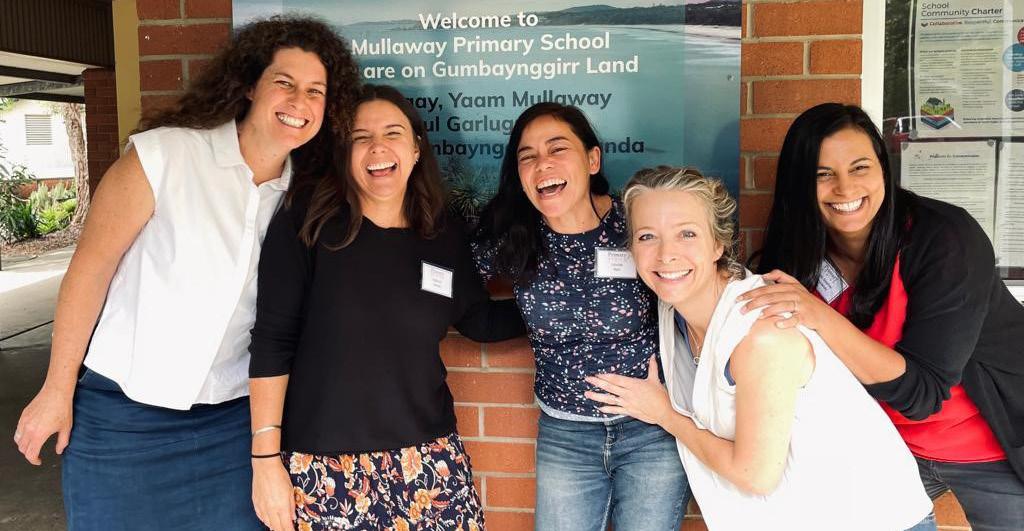
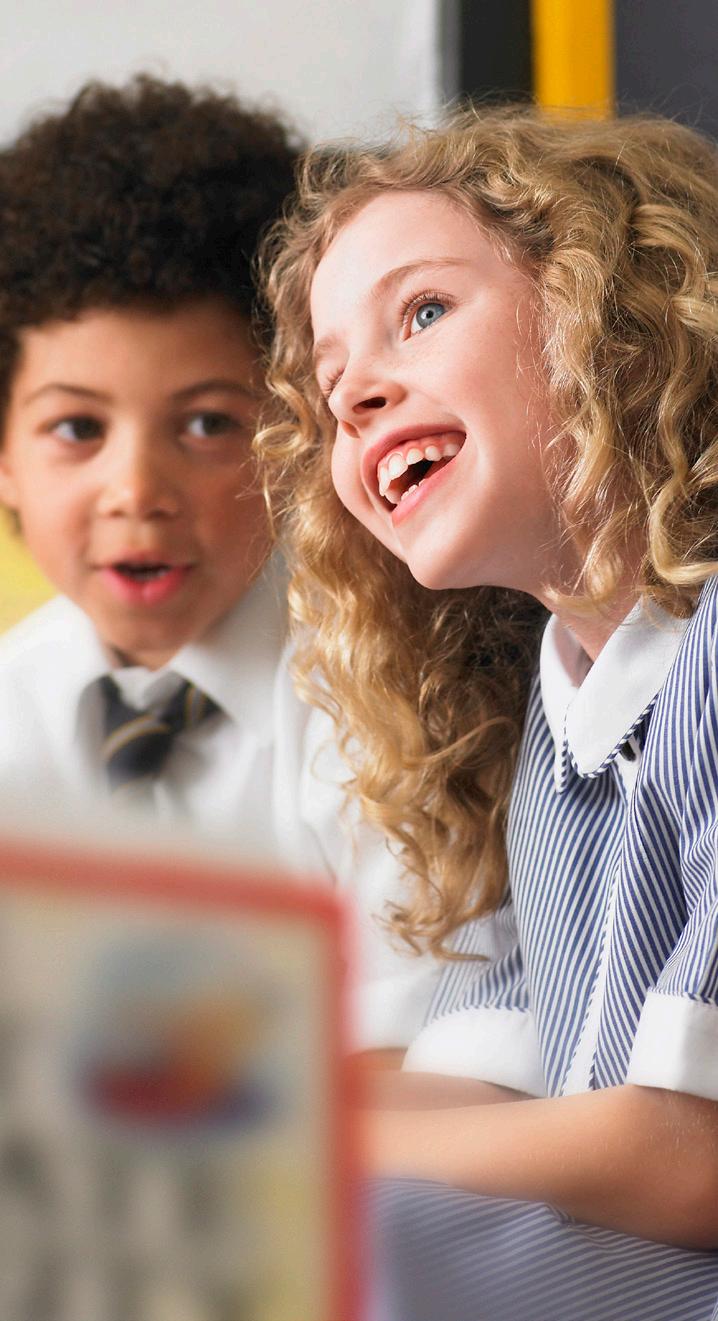
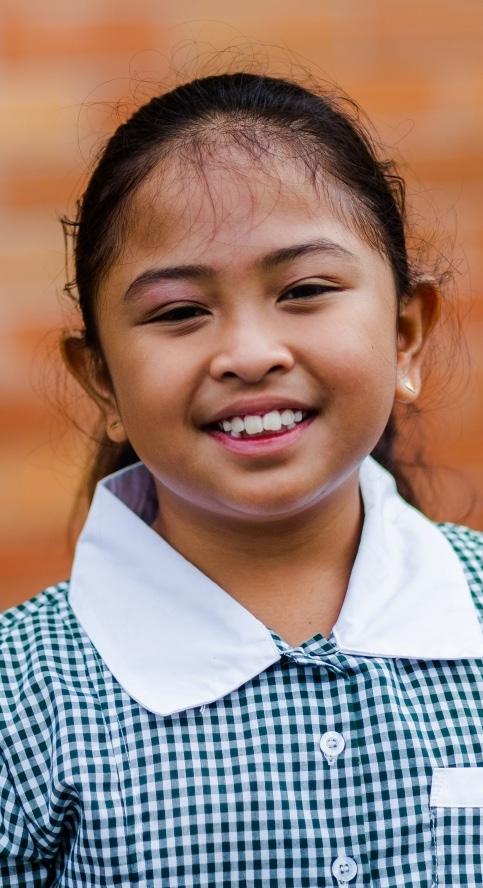
I have enjoyed ethics very much. I’ve learnt how it’s okay for me to express my thoughts and be listened to by everyone, how to reason, how I can agree or disagree and be able to explain why.
I wish I could continue in high school with this ethics teacher because I love the way she makes me and us feel special, included, and it is okay to enjoy learning and have some fun with it.
Being in ethics class this year made me feel like I grew my mind. I also have grown my voice.
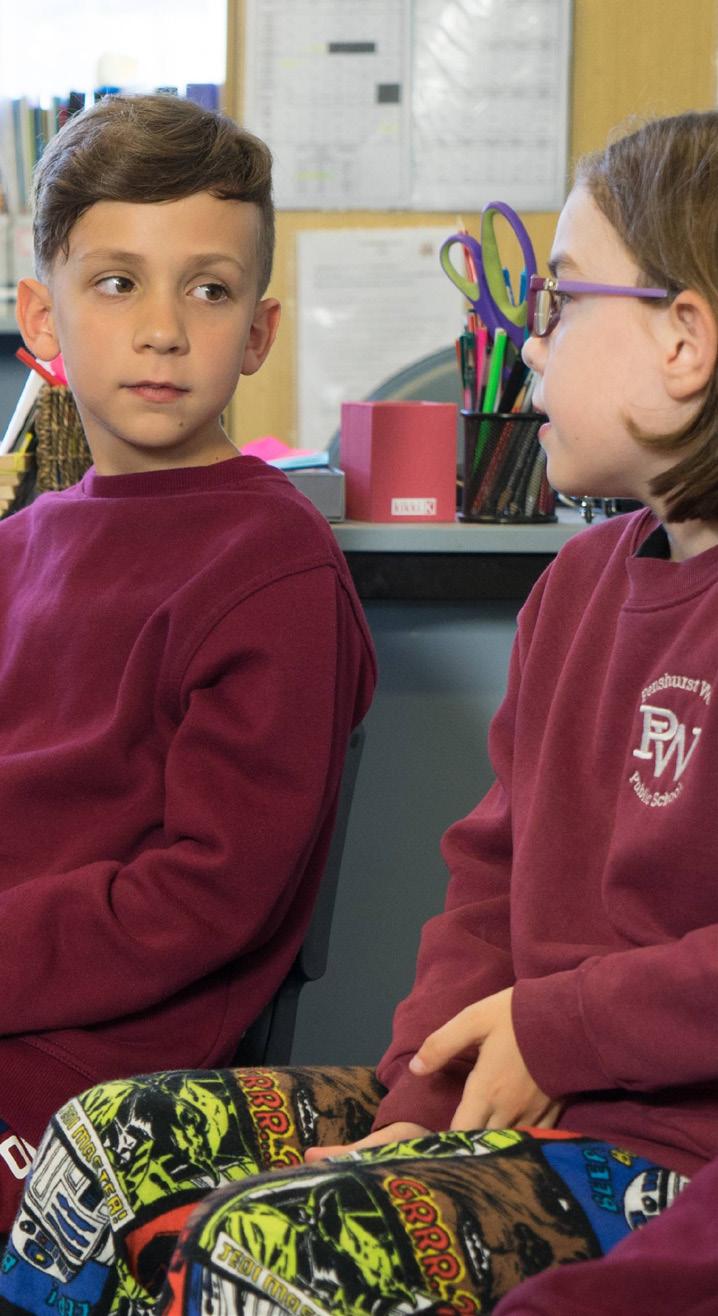
Ethics classes have helped me improve my confidence.
Ethics classes have taught me to think differently, to look at things in a more problem-solving way and change my ideas.
Ethics lessons were fun, I laughed.
I didn’t want to be in ethics to begin with but after a few weeks I started to enjoy it and now at the end of the year, I’ve loved the experience.

March 2023: Ethics volunteer Emily McGrory wrote a sparkling piece for MamaMia website about why she stepped up to be a volunteer. “Primary Ethics uses a set of discussion rules that are adhered to closely. The first is, Only one person speaks at a time, the second is, Pay attention to the person who is speaking. How many times have you been in a conversation where someone starts talking over the top of you? Doesn’t feel great, does it? Every time this happens, I think back to these rules and realise how important it is to teach children these social skills.”
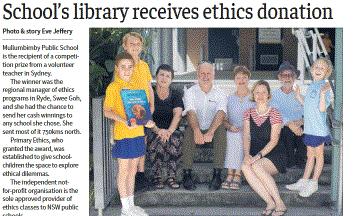
2023:
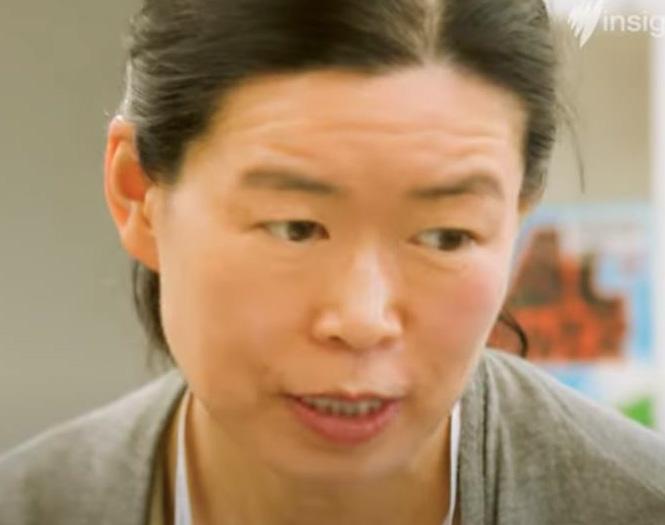
May 2023: What is empathy and how can we learn to be more empathetic? Insight from SBS-TV visited a Sydney school to film an ethics class facilitated by our volunteer Shing Ka.
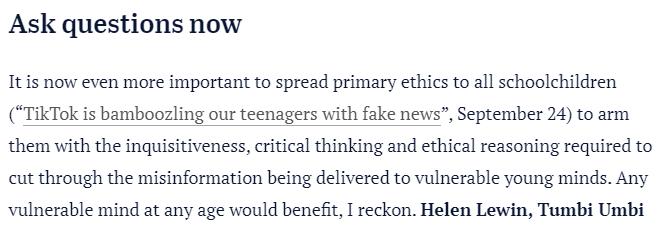
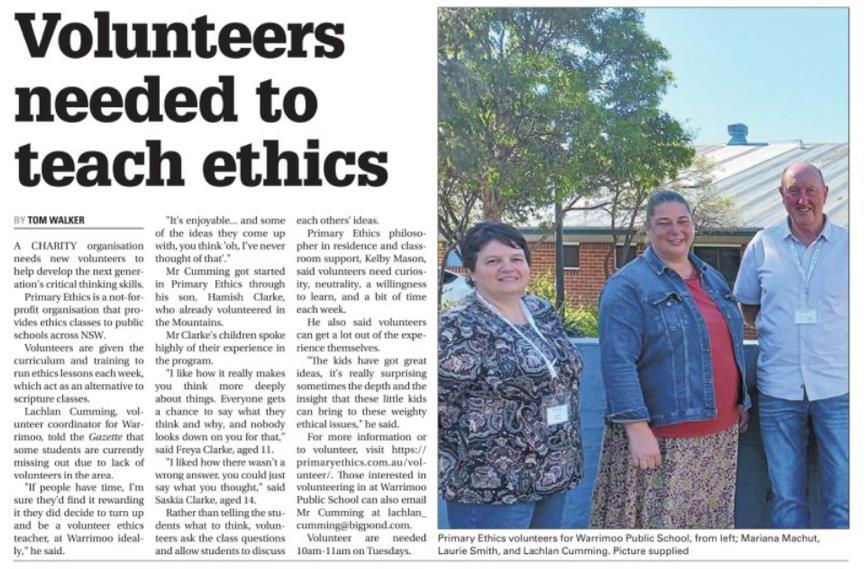
2023:
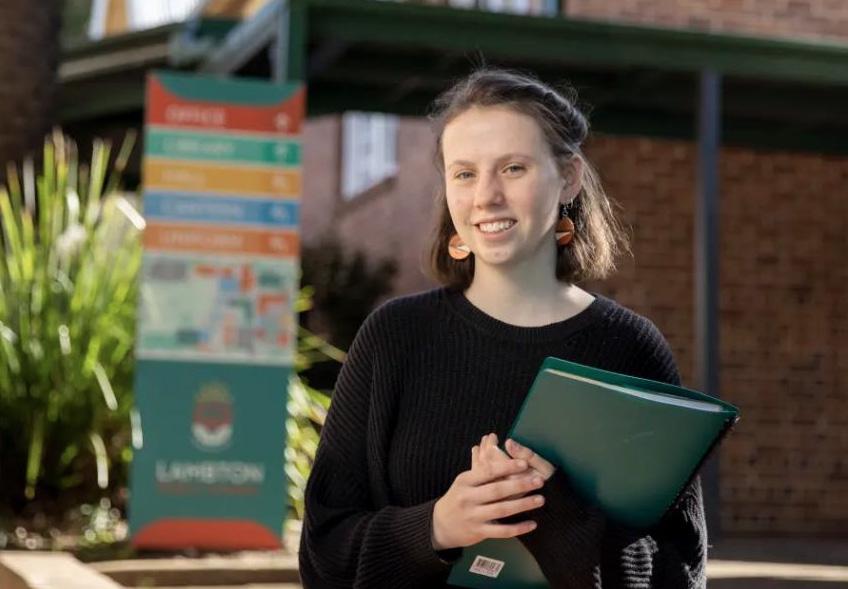

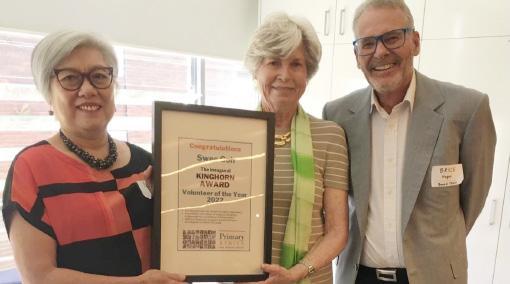
The inaugural Kinghorn Award for ethics volunteer of the year 2022the outstanding Swee Goh
Almost 200 nominations were received for our first Kinghorn Award for ethics volunteers, uncovering the wealth of passion, dedication and sheer hard work that goes into our ethics program across the state every week.
Our outstanding winner Swee Goh manages the ethics program covering 12 schools, 62 volunteers and over 1000 children in the Ryde region of inner northwest Sydney. Swee won $4000 to direct to the schools of her choice. Some of that money went to a very supportive school in her district, Smalls Road Public School
She also wanted to give to a school that had been badly affected by floods early in 2022 – Mullumbimby Public School in the northern rivers.
Reflections from Swee: “I find being an ethics volunteer extremely satisfying as I am working with fellow volunteers and a supportive and professional organisation. They all share the same interest, passion and commitment to bringing ethics education to children in primary schools.
“Volunteering with Primary Ethics drew me back to my first role as a teacher and my experience as a manager. The big difference is working with people who want to do what they do, not because they are paid to do it!”
“If I had to pick one person to start Primary Ethics from scratch tomorrow, Swee would be the first volunteer I would contact” – Primary Ethics program manager
Tatar Holmes came aboard the Primary Ethics classroom support team early in 2023. As with many of our staff, Tatar initially got involved through her own children taking ethics. Tatar has a background in coaching and management in the financial sector, experience perfectly suited to being a classroom support officer, providing ongoing assistance for volunteer teachers so that they can maximise outcomes for their students as well as role satisfaction for themselves.
“Joining the classroom support team has been a fabulous experience as I work in a team passionate about ethics education who strive to provide the support volunteers need to deliver high quality ethics lessons. I really do have to pinch myself, I’m so lucky to be part of such an important project, to help educate future generations to be empathic, respectful free thinkers.
“It took a decade of working in the financial sector and the birth of my second set of twins to realise that my time was precious and I should only dedicate it to work that aligns with my values. I then studied community development and sustainability. Primary Ethics aligns perfectly with my view that polarisation is one of the biggest challenges we face in our society. Ethics education promotes listening to others and weighing up the facts and also celebrates being open to changing an opinion.
“Volunteering in areas of youth support services in the Blue Mountains, I realised how fragile our teenagers are. Being part of the high schools support program has meant I can be part of the solution in respecting the agency of children who are going through a challenging stage in their lives.
“I enjoy building rapport with volunteers (usually by phone) and working together to come up with suggestions to solve their problems. It is such a pleasure to meet people from very diverse backgrounds who are all committed to this work. I especially connect with volunteers who are starting a program in a new school, recalling how I felt when I began as a volunteer eight years ago.
“It is heartening to be able to lighten the load for volunteers who may already be juggling a fair bit
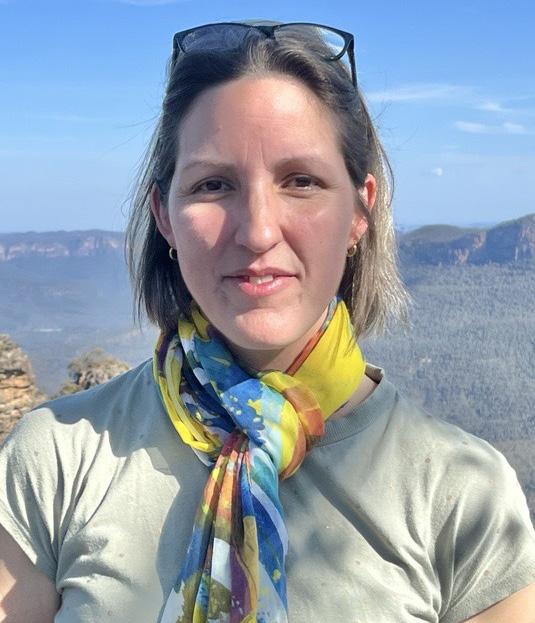
(parenting, work) simply by having a nice chat and offering a few tips.
“New teachers receive extensive training which gives them all the tools to successfully deliver ethics lessons. However, when they reach the classroom, they can find that juggling all these skills is complex and questions about how to improve arise. Our new teacher check-in provides an easy way to receive coaching early on to build confidence and resolve any issues.”
“Polarisation is one of the biggest challenges we face. Ethics education promotes listening to others and weighing up the facts and also celebrates being open to changing an opinion.”
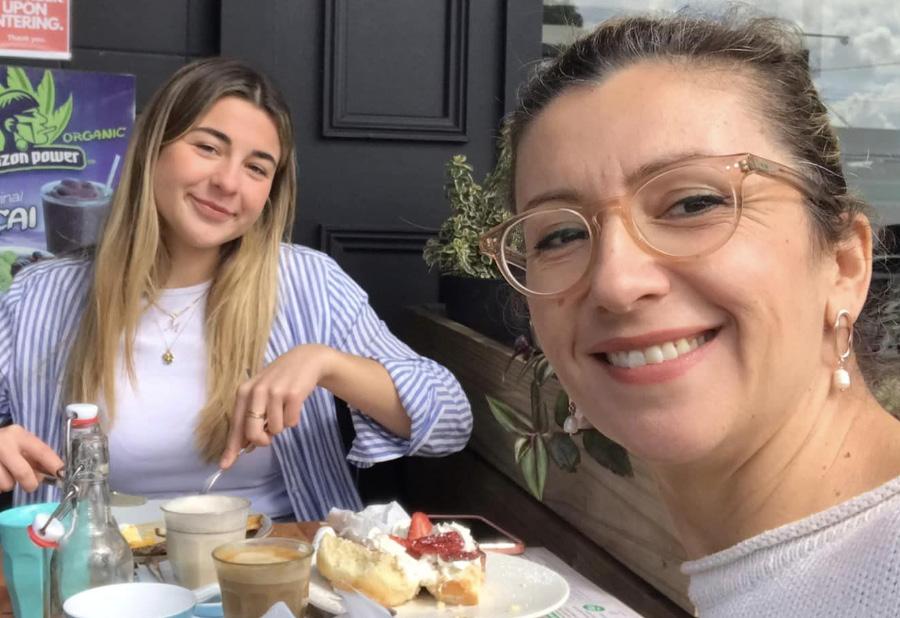
Ima and Mia are a mother-daughter ethics-teaching duo. Mia is only 18 and was inspired to become an ethics teacher herself having seen her mother in action over the years.
Ima’s story: Being a health clinician and public health researcher, I’d known the importance and power of critical reasoning and ethical thinking. In the past five years I have enjoyed teaching children of all ages and was able to see what wonderfully inquisitive, imaginative, capable and open-minded people primary school children are.
I have dedicated myself to the Primary Ethics program as my motivation is not to teach my children, but to ensure that my local school continues to offer and provide this invaluable curriculum to new generations.
Mia’s story: When my mother started teaching ethics when I was in high school, I became interested in the content of the lessons and loved the concept of group discussion and building on each other’s ideas as a way of learning. As a successful debater and public speaker and currently a medical science student, I believe inquiry is an integral part of learning and a healthy, argumentbased discussion is the only way to progress and develop. I hope that my example will serve as an inspiration to many more young ethics teachers to come.
When Kate decided to volunteer to be an ethics teacher she received a serious and foreboding warning from her then eight-year-old daughter: “Teaching kids is tough.” Luckily, she was not discouraged!
I could never have imagined how much I would learn and how many rewarding moments it would bring. Ethics classes give children a chance to practise skills like taking turns to speak, listening carefully to other students and forming and expressing their own ideas. Lessons are designed to enhance critical thinking and ethical reasoning skills, helping children make decisions based on logic and evidence rather than out of habit or due to peer pressure.
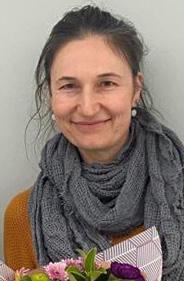
I enjoy teaching ethics because I find the topics fascinating; the lesson materials really make me think (as well as the children). Over the years, topics I’ve taught include empathy, fairness, being similar and different, good reasons, voting, punishment and vanity. It is incredible to be in a role where I can be around children and hear what they think. Their insights and thought processes can be impressive, surprising and often hilarious! It’s not always easy, as my daughter warned, but I also love the challenge of engaging the kids and encouraging them to think more deeply about certain topics.


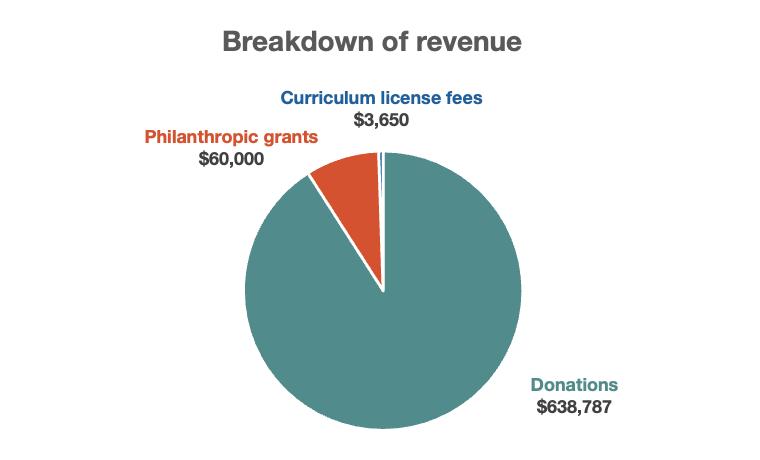

Just like our volunteer ethics teachers and coordinators, all the Board members donate their time, skills and experience to support Primary Ethics.
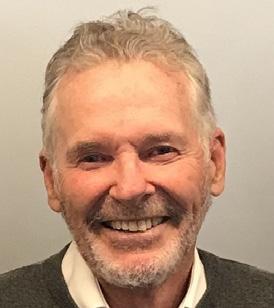
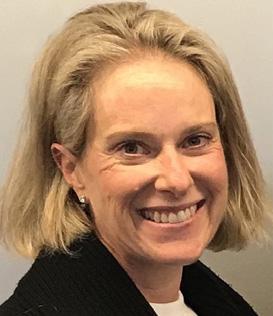
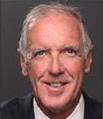
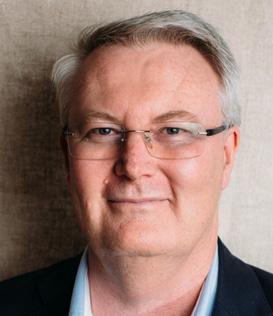



Founding Chair of Primary Ethics and Chairman of the Hogan Family Foundation. Bruce has had an extensive non-executive director career following his executive career in investment banking. Past directorships include Chair of Snowy Hydro Ltd, State Super Financial Services and non-executive director of NSW Treasury Corporation, GIO, Funds SA and Energy Australia.
Nicola is an experienced director of both NGO and private companies, currently including the National Justice Project Advisory Board, Talent Beyond Boundaries Advisory Board and The Australian Ballet Foundation Board. She works as an advocate for refugees across the private school sector.
Steve is a finance industry professional of more than 40 years. He has held senior roles at ANZ and UBS and was CEO at NSW TCorp. Steve currently chairs the ASX Clearing and Settlement Boards, the AOFM Audit Committee and the Bond Issuance and Due Diligence Committee for National Housing Finance & Investment Corporation.
Executive Director of The Ethics Centre since 1991. Simon is an Adjunct Professor of the Australian Graduate School of Management at UNSW, a Fellow of CPA Australia, the Royal Society of NSW and the Australian Risk Policy Institute.
For the past 35 years, Matina has specialised in audit and accounting for wealth asset managers, wealth management, funds management, superannuation, retail and investment banking and not-for-profits. She has also been the auditor for Primary Ethics. Matina is a Fellow of Chartered Accountants Australia and New Zealand.
Roger provides HR and strategy advice across a wide range of businesses. Roger joined Primary Ethics in 2011, providing leadership for the classroom support team while also offering pro bono HR advice for senior managers.
Nigel held the role of financial adviser in the NSW Government for 10 years, as well as consulting to the NSW Treasury Corporation on risk strategy. He also sat on the Boards of the CSIRO and the Electricity Commission of NSW.
Our valuable work supporting children to think, reason and discuss respectfully is possible because of many generous supporters, including donations from individuals, organisations and foundations. A huge thank you to everyone who makes what we do possible.
Kinghorn Family Foundation
Hogan Family Foundation
James Chen
David Paradice
Cameron and Georgina McCullagh
Rob Keldoulis
John Geraghty
Michael Ahrens
Nigel Stokes
Susan Gabriel
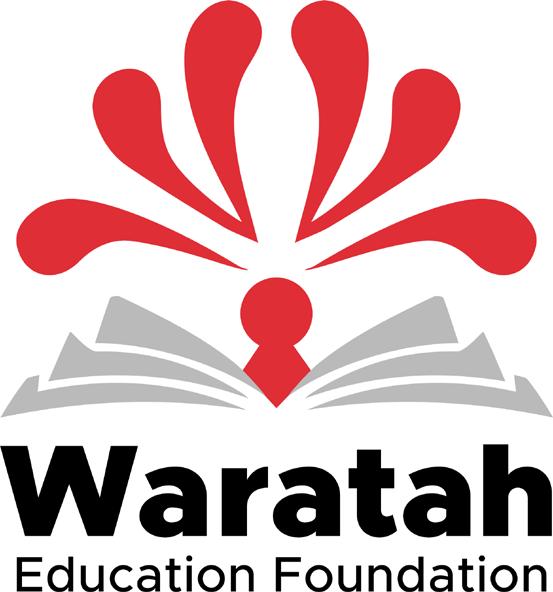
Primary Ethics was thrilled to become a Waratah Education Foundation supported charity in 2023. Waratah Education Foundation is supporting the advancement of education in Australia.
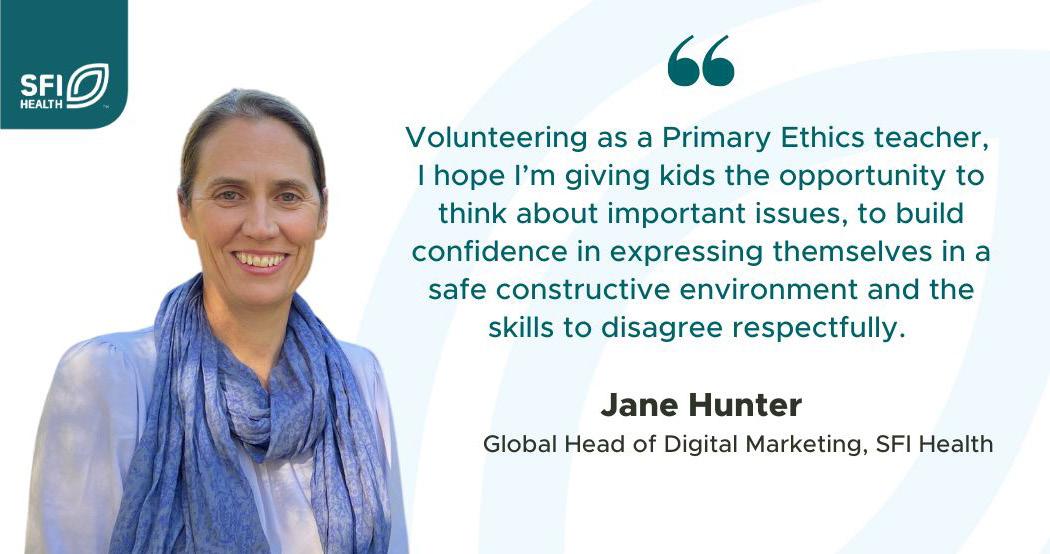
We have had many generous supporters since day one. Together they laid the foundations for our ethics program. We always seek to acknowledge their contribution to our growth. Significant contributors include:
Kinghorn Family Foundation
Berg Family Foundation
Hogan Family Foundation
Paradice Family Foundation
Christopher Cuffe Foundation
Ainsworth Family Foundation
James Chen
Rob Keldoulis
Vincent Fairfax Foundation
Hunt Family Foundation
Cameron & Georgiana McCullagh
Gray Family Foundation
Peter Joseph
Stef Adelbert
John Gerahty
Rob Ferguson
Michael Cole
Colin Bell
Robin Low
Helen Lynch
Gonski Foundation
Max Bowen
Brennan Family Foundation
Ferris Family Foundation
Geoff Wilson
Nick Greiner
Wilson Asset Management
Nine Links Foundation
Sky Foundation
Tim Ryan
Ian & Linda Martin Charitable Foundation
James Fairfax
Susan Gabriel
Australian Philanthropic Services
Michael Pain
Robert Barry
Tony Schultz
Percy Allan
Samuel Weiss
Alan Cameron
Walter Lewin Foundation
Bruce Morgan
Australian Ethical Investments
Nigel Stokes
Primary Ethics is an independent not-for-profit charity and receives no government funding. We rely entirely on donations from many large and small generous funders. To donate visit the Give Now platform set up for not-for-profit organisations like us: www.givenow.com.au/primaryethics. This is a safe and efficient way to donate. If you prefer we can send you our account details to make a direct deposit.
There are lots of other ways to get involved with Primary Ethics. You can choose to volunteer, organise workplace giving, become a corporate partner or leave a gift in your will.
If your business is interested in supporting our work financially, please reach out to Georgie McGrillen, our fundraising manager: georgie.mcgrillen@primaryethics.com.au
We really appreciate your support to allow our vital program to continue. Thank you for whichever ways you decide to support the work of Primary Ethics.
W: www.primaryethics.com.au
P: (02) 8068 7752
Email: helpdesk@primaryethics.com.au
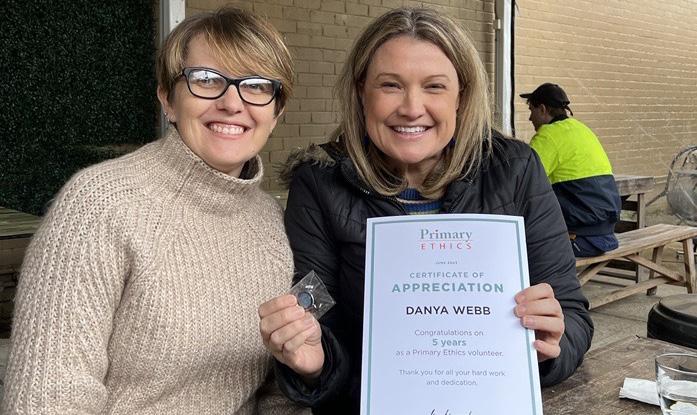
By remembering Primary Ethics in your will, you would be making a valuable commitment to support ethics education for children into the future. A bequest is one of the most enduring ways you can help Primary Ethics in our work. Your promise of future support is deeply appreciated.
For more information about leaving a bequest in your will, contact our Engagement Manager
Elizabeth Allen
T: (02) 8068 7752
E: elizabeth.allen@primaryethics.com.au
We will always respect your privacy and any information you provide to us will be treated in the strictest confidence.
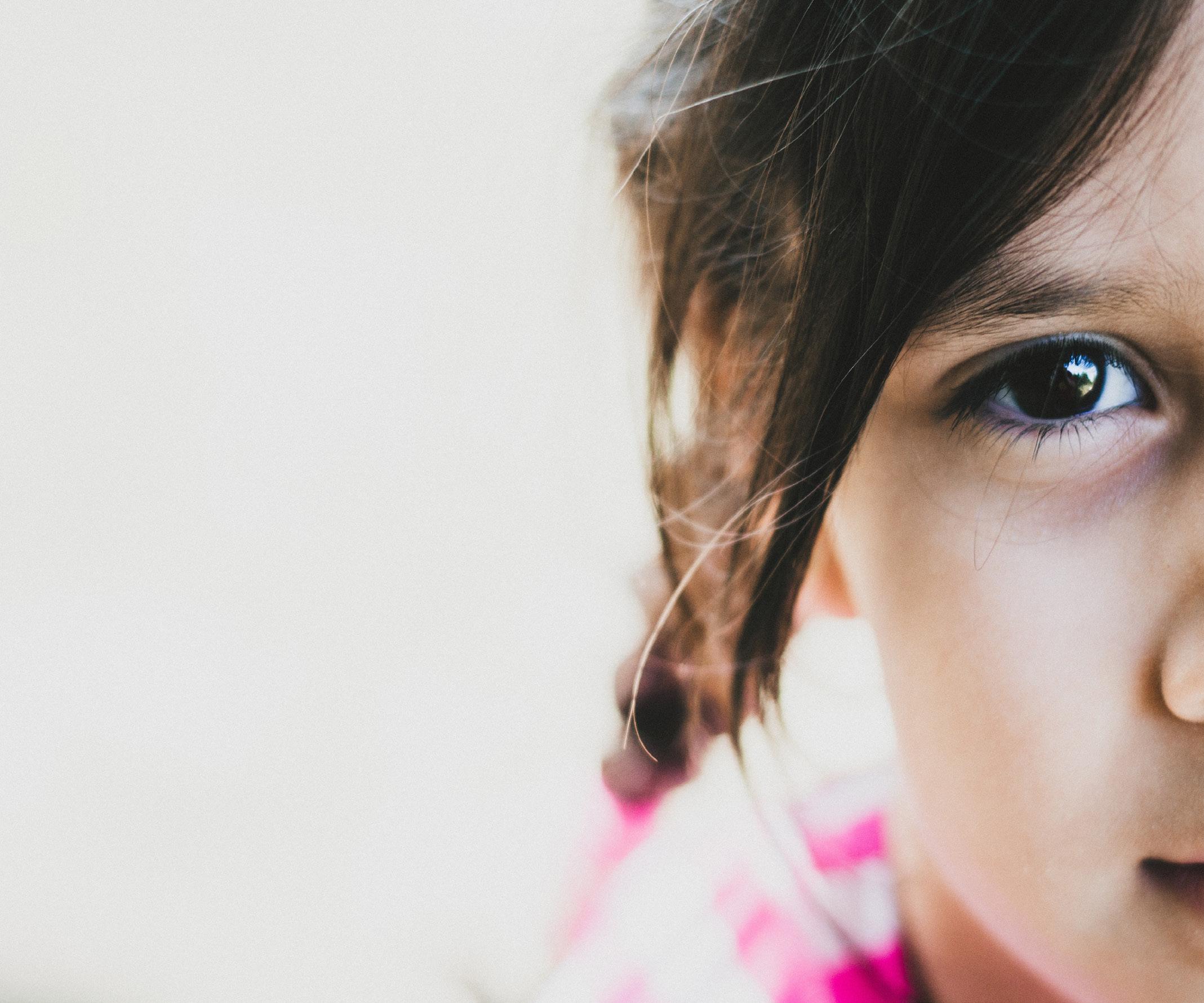
We really appreciate your support to allow our vital program to continue. We rely entirely on donations as we are an independent not-for-profit charity. A huge thank you to everyone who supports our work.
Facebook: www.facebook.com/primaryethics
Insta: @primaryethics
LinkedIn: au.linkedin.com/company/primary-ethics
W: primaryethics.com.au
E: helpdesk@primaryethics.com.au
P: (02) 8068 7752
Suite 303, 24-30 Springfield Ave, Potts Point, NSW 2011
